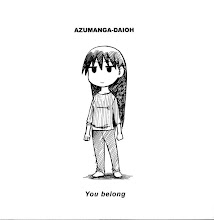Coined in the 1980's as a derogatory term for obsessive fandom, otaku has become synonymous with cool in Japan and around the world. Following a 2005 paper by the Nomura Research Institute, the Japanese government decided to use the growing popularity of otaku culture as a way to expand its influence globally.
In the early 2000's an area of Tokyo classically known for bleeding edge technology, Akihabara, shifted to being the otaku capital of the world. A key player in the raise of the neighborhood as the otaku Mecca is a story born from the message boards of 2channel, Densha Otoko (電車男) or Train Man. The story is about a 20-something otaku who comes out of his shell to help a woman being harassed by a drunk on a train. The intervention blossoms into love between a nerd and a normal girl, giving all hapless fanatics a ray of hope in their love lives.
The events unfolded on 2channel as the purported Train Man came to his online peers for advice dealing with the situation. The mass of fellow otaku cheered him on in pursuing the difficult task of succeeding in establishing a 3D relationship. The story gained momentum quickly and soon after the events played out transcriptions of the BBS threads were turned into a book. The book gained wide popularity and eventually spawned a movie, TV series, play and manga, depicting the events and adding to the legend of the story.
The legitimacy of the events and identity of the Train Man are uncertain. The impact it had with highlighting the growing feelings about Akihabara and it's place in the popularization of nerd culture in Japan are unmistakable. It helped to cement the otaku as a culture all of its own. A culture that would soon be recognized, per the Nomura report, as carrying significant economic and societal clout.
Prior to the 21st century otaku were viewed as loners, shut ins and socially maladjusted individuals. The label was attached to a hand full of shocking murders in the 80's and 90's, including the Aum Sinrikyo sarin gas attack in 1995. In the early 2000's it began to heavily invade pop culture and turned from something to be scorned into a hip thing to be associated with.
Since the recognition of otaku as a legitimate sub culture in Japan, the Japanese government has worked to promote it to the rest of the world as a way to gain influence and expand exports and tourism. The movement has gone on for a decade with no sign of abating. Otaku culture digs deeper into the global markets through growing accessibility and monetization. The real influence that Cool Japan has to sway large amounts of capital and interest in Japan it's self is still difficult to determine. Even if it's importance has been over stated Japan is continuing to pursue it for the time being and otaku world wide are reaping the greatest benefits. Partially due to the help of a lonely man who gathered up his courage to save a woman from harassment or at least the legend of such an act.
In the early 2000's an area of Tokyo classically known for bleeding edge technology, Akihabara, shifted to being the otaku capital of the world. A key player in the raise of the neighborhood as the otaku Mecca is a story born from the message boards of 2channel, Densha Otoko (電車男) or Train Man. The story is about a 20-something otaku who comes out of his shell to help a woman being harassed by a drunk on a train. The intervention blossoms into love between a nerd and a normal girl, giving all hapless fanatics a ray of hope in their love lives.
The events unfolded on 2channel as the purported Train Man came to his online peers for advice dealing with the situation. The mass of fellow otaku cheered him on in pursuing the difficult task of succeeding in establishing a 3D relationship. The story gained momentum quickly and soon after the events played out transcriptions of the BBS threads were turned into a book. The book gained wide popularity and eventually spawned a movie, TV series, play and manga, depicting the events and adding to the legend of the story.
The legitimacy of the events and identity of the Train Man are uncertain. The impact it had with highlighting the growing feelings about Akihabara and it's place in the popularization of nerd culture in Japan are unmistakable. It helped to cement the otaku as a culture all of its own. A culture that would soon be recognized, per the Nomura report, as carrying significant economic and societal clout.
Prior to the 21st century otaku were viewed as loners, shut ins and socially maladjusted individuals. The label was attached to a hand full of shocking murders in the 80's and 90's, including the Aum Sinrikyo sarin gas attack in 1995. In the early 2000's it began to heavily invade pop culture and turned from something to be scorned into a hip thing to be associated with.
Since the recognition of otaku as a legitimate sub culture in Japan, the Japanese government has worked to promote it to the rest of the world as a way to gain influence and expand exports and tourism. The movement has gone on for a decade with no sign of abating. Otaku culture digs deeper into the global markets through growing accessibility and monetization. The real influence that Cool Japan has to sway large amounts of capital and interest in Japan it's self is still difficult to determine. Even if it's importance has been over stated Japan is continuing to pursue it for the time being and otaku world wide are reaping the greatest benefits. Partially due to the help of a lonely man who gathered up his courage to save a woman from harassment or at least the legend of such an act.









No comments:
Post a Comment